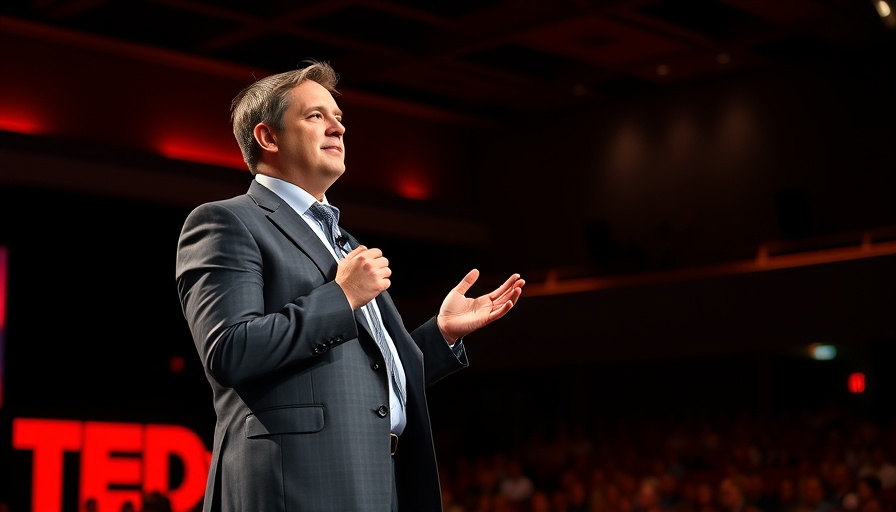
Understanding Leadership Beyond Simplistic Advice
As professionals, we often find ourselves grappling with the complexities of leadership. The challenge of motivating a team to not just comply, but truly engage with their work, underscores the need for a deeper understanding of relational dynamics within leadership. In his TEDx talk, Dr. Rafael Chiuzi sheds light on the nuanced failures of conventional leadership advice, such as "leading by example" and emphasizing transparency.
In 'Why is good leadership advice often flawed?', Dr. Rafael Chiuzi explores the complex nature of leadership, providing insights that necessitate a deeper analysis of effective leadership strategies.
How Leading by Example Can Backfire
Dr. Chiuzi illustrates the pitfalls of "leading by example" through the story of a leader named Tina, who was dedicated to her work but inadvertently created an environment of pressure and disengagement among her team members. This serves as a stark reminder that leadership doesn't operate in a vacuum. The way we exemplify our work ethic or communication styles may not resonate positively with everyone. For one team, long hours may exemplify dedication, while for another, it might signal overwhelm. Understanding this divergence is crucial, as it prevents us from imposing our values unwittingly onto our teams.
Conceived Fairness: The Illusions and Realities
The journey to organizational efficacy also involves navigating perceptions of fairness. Dr. Chiuzi recounts the experience of an executive named Sahed, who believed in distribution based solely on merit. However, the outcomes were perceived as biased, underscoring that fairness isn't simply about outcomes; it hinges significantly on the process—what Dr. Chiuzi terms procedural justice. In today’s complex corporate landscapes, it's imperative to communicate not just decisions but the rationale behind them to foster a sense of equity and respect.
Transparency: More Complex Than It Seems
While it's widely accepted that transparency is essential in leadership, the nuances around sharing information can lead to confusion and anxiety rather than clarity. An extreme example of excess transparency firms sharing every detail of decision-making led to increased employee anxiety and attrition rates, showcasing that, in leadership, context matters significantly. Therefore, leaders must be adept at discerning what to communicate and how, balancing openness with discretion for the well-being of their workforce.
The Relational Dynamic: Leadership as a Shared Experience
Dr. Chiuzi’s assertion that leadership is a "co-created" phenomenon speaks to the relational dynamics between leaders and their teams. This perspective moves away from the notion that authority alone can dictate effective leadership. History informs the present; every team has its unique history and culture, which every new leader must navigate tactfully. Whether through nurturing trust or encouraging dialogue, effective leaders are those who understand the historical context of their team dynamics.
Lessons from Contemporary Leadership: Jacinda Ardern's Approach
Examining modern leadership through the lens of Jacinda Ardern, former Prime Minister of New Zealand, we see a vivid example of how empathy and inclusiveness can earn credibility and trust. Following the tragic Christchurch mosque shootings, her swift actions resonated deeply with her nation, illustrating how context, values, and responsive action built a sense of unity. Ardern’s leadership exemplifies that understanding collective grief and acting decisively can create a lasting bond between leaders and citizens.
Revisiting Leadership Constructs: What Are We Missing?
To effectively lead, one must ask profound questions about the relational dynamics at play. Instead of seeking to impose authority, leaders should focus on creating an environment conducive to collaboration and mutual respect. This approach doesn't merely enhance individual motivation, but can spark collective creativity and innovation, leading to change and progress in various sectors, including business, education, and social enterprise.
Concluding Thoughts on Effective Leadership
In our pursuit of effective leadership, it is paramount to remember that success in guiding teams does not arise from checklists of widely accepted virtues. Instead, transformative leadership emerges from understanding the unique narratives, histories, and relational intricacies within teams. As we move towards future challenges across diverse fields, adopting a mindset of partnership and relational inquiry can unlock greater potential in our organizations. As we take inspiration from Dr. Chiuzi's insights, let’s advocate for leadership practices that prioritize human relationships, promoting environments where every member feels valued and empowered to contribute.
 Add Row
Add Row  Add
Add 




Write A Comment